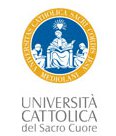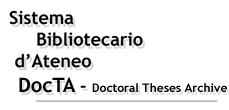|
|
DocTA - Doctoral Theses Archive >
Tesi di dottorato >
SCUOLA DI DOTTORATO IN SISTEMA AGRO-ALIMENTARE >
Citazione:
Utilizza queste indicazioni per citare o creare un link a questo documento.
|
Stagnati, Lorenzo. "GENOME WIDE ASSOCIATION STUDIES TO IDENTIFY GENES FOR RESISTANCE TO FUSARIUM EAR ROT IN MAIZE", Università Cattolica del Sacro Cuore, XXIX ciclo, a.a. 2015/16, Piacenza, [http://hdl.handle.net/10280/19083].
|
| Titolo: | GENOME WIDE ASSOCIATION STUDIES TO IDENTIFY GENES FOR RESISTANCE TO FUSARIUM EAR ROT IN MAIZE |
| Autore/i: | STAGNATI, LORENZO |
| Tutor: | MAROCCO, ADRIANO
BUSCONI, MATTEO
LANUBILE, ALESSANDRA |
| Coordinatore: | TREVISAN, MARCO |
| Lingua: | ENG |
| Abstract in italiano della tesi: | Fusarium verticillioides è l’agente responsabile della Fusariosi della Spiga del mais, contamina la granella con fumonisine, micotossine responsabili di diverse patologie umane e animali.
Per la resistenza alla fusariosi e all’accumulo di fumonisine esiste variabilità tra genotipi diversi ma non sono ancora disponibili ibridi immuni.
L’obiettivo di questo lavoro è stato quello di individuare marcatori associati alla resistenza a F. verticillioides.
Mediante un bioassay è stato testato un association panel per la resistenza a F. verticillioides.
Al fine di identificare i marcatori di resistenza sono stati applicati un approccio GWAS e uno per geni candidati.
L’analisi GWAS è stata eseguita con 227K SNPs restituendo 206 marcatori significativi.
Da un lavoro di RNASequencing sono stati individuati i geni coinvolti nella risposta a F. verticillioides mentre i geni R sono stati recuperati della letteratura scientifica.
Genotipi resistenti (CO433 e CO441) e suscettibili (CO354 e CO389) sono stati scelti per individuare polimorfismi nei geni candidati da associare ai fenotipi rilevati mediante il bioassay. Quattro marcatori sono risultati significativi.
Infine, la correlazione tra l’incidenza della fusariosi rilevata in campo e mediante bioassay è stata analizzata in una popolazione di 172 RIL derivanti da CO441 x CO354, tuttavia, non è stata individuata alcuna corrispondenza. |
| Abstract in inglese: | Fusarium verticillioides is the causal agent of Fusarium ear rot (FER) in maize and contaminates grains with fumonisin, a family of mycotoxins involved in several human and animal diseases. Quantitative genetic variation exists for resistance to FER and fumonisin contamination among genotypes, however, resistant maize hybrids are currently not available.
The aim of this work was the identification of genetic markers associated to resistance against F. verticillioides.
A bioassay was used to screen inbred lines of the maize association population for FER resistance, GWAS and candidate gene approaches were applied to identify markers.
GWAS was performed using a 227K SNP matrix and resulting in 206 significant markers.
Genes involved in F. verticillioides response in developing maize kernels were retrieved from a previous RNASequencing study while maize R genes were retrieved from scientific literature. Resistant (CO433 and CO441) and susceptible genotypes (CO389 and CO354) were selected to amplify and sequence candidate genes. Polymorphisms detected were used to find association with phenotypes scored using the bioassay. Four significant markers were found.
Finally, the correlation between FER phenotypes scored in field experiments and bioassay phenotypes was investigated. A population of 172 RILs (CO441 x CO354), was tested. No correlation was found. |
| Data di discussione: | 31-mag-2017 |
| URI: | http://hdl.handle.net/10280/19083 |
| È visualizzato nelle collezioni: | SCUOLA DI DOTTORATO IN SISTEMA AGRO-ALIMENTARE
FACOLTA' DI AGRARIA
|
File in questo documento:
| File |
Descrizione |
Dimensioni | Formato | Accessibilità |
|---|
| tesiphd_completa_Stagnati.pdf | Testo completo | 7,35 MB | Adobe PDF | non consultabile
|
| 01_frontespizio_tesiphd_Stagnati.pdf | Frontespizio, introduzione, capitolo I | 5,4 MB | Adobe PDF | Visualizza/apri
|
|
Accesso e utilizzo dei contenuti di DocTA
|



